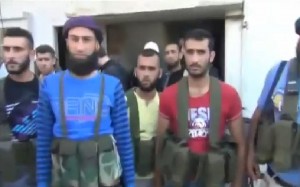
On the Need for Long-Term Strategic Thinking in the Middle East
As the debate about what, if anything, to do about the situation in Syria continues, I recently sat down with Dr. Philip Seib of the USC Center on Public Diplomacy, and discussed the course for American public diplomacy over the next few years. Seib has visited a number of Arab countries regularly, including Syria, and recently authored an op-ed at the Huffington Post discussing American perspectives of what has been happening in the Middle East.
Recognizing the violent nature of terrorism, while at the same time giving credence to the democratic aspirations rising in the countries of the Arab Spring, Seib advocates a smart power strategy:
The American response should be based on a two-level strategy. The first requires an unabashed embrace of hard power when it is needed. The fight against a reconstituted Al Qaeda must be waged assertively, because, as the tepid response to Al Qaeda during the 1990s should have taught us, anything less than concentrated lethal force, when required, lets terrorists’ bravado and strength increase.
The second level is more complicated, requiring brains more than brawn. The rebuilding of the Arab world after the revolutions that began in 2011 remains an essential task for countries such as the United States that believe that the yearnings for democracy among most Arabs are genuine and that a hopeful future can be found once the debris of tyranny is cleared away.
This is where soft power is important. America’s public diplomacy must continue to reach out to Arab publics that are willing to consider the merits of modernized and liberalized economic and political life.
Policy makers would be wise to carefully note that the situations in Syria and other affected countries is incredibly precarious. Decisions should not be made on a short term basis. Rather, the long term consequences of America’s decisions regarding these countries must be considered. What are our long term goals? Might a short term gain lead to a long term loss?
From a public diplomacy standpoint, America must be very careful about giving military and other logistical support to groups that it knows very little about. Emphasis must be placed on building long-term relationships, understanding the people with which we are communicating, and fully understanding their actual needs. Seib notes:
…many of those watching Syria carefully warn that the “Free Syrian Army” and other anti-Assad factions should not automatically be embraced as “freedom fighters,” but rather should be watched warily.
An understanding of long-term strategy dictates that arming rebel groups may neither serve the strategic interests of the United States nor the democratic aspirations of the moderate Syrian public. Arming groups merely because they oppose Bashar al-Assad may merely result in another type of militant government that ultimately continues to harm those whom we wish to support. As can be seen in the case of Libya, handing out weapons does not mean people will be willing to lay them down after the immediate conflict has concluded. Why would it be in their interest to do so?
These are the types of revelations that must be considered when planning strategic responses to the changes that have been occurring over the last year. Before we make those choices, we need to better understand with whom and what we’re dealing. In Syria, it does not appear that we do.







[…] : On the Need for Long-Term Strategic Thinking in the Middle East Policy makers would be wise to carefully note that the situation in Syria and other affected […]
[…] On the Need for Long-Term Strategic Thinking in the Middle East […]